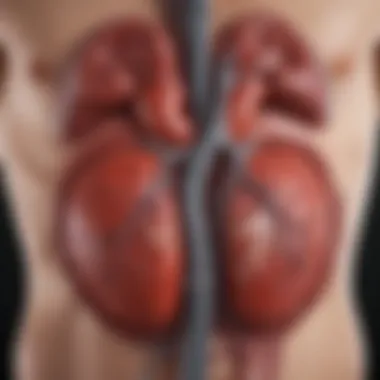Kidney Function and Blood Pressure: A Vital Link


Intro
Understanding the link between kidney function and blood pressure regulation is critical for healthcare professionals and patients alike. The kidneys play a pivotal role in maintaining homeostasis, a balance vital for overall health. When kidney function is compromised, the repercussions extend beyond urination and waste management; they touch upon blood pressure control and vascular health. This section delves into the complexities and implications of such interconnections, particularly in the context of chronic diseases and lifestyle factors.
Research Background
Overview of the Scientific Problem Addressed
Hypertension, or high blood pressure, is a prevalent condition affecting millions globally. It serves as a key risk factor for cardiovascular diseases, strokes, and kidney failures. The kidneys regulate blood pressure through various mechanisms, including fluid balance and hormonal control. However, a disruption in these functions may lead to severe health problems.
Historical Context and Previous Studies
Historically, research has focused on separate aspects of kidney function and blood pressure regulation. Early studies mostly emphasized the significance of renal physiology in fluid balance. Over time, scholars began to uncover specific pathways and mechanisms, such as the renin-angiotensin-aldosterone system, which is crucial for regulating blood pressure. The relationship is complex, with evidence showing that both hypertension and chronic kidney disease often co-exist, leading to a cycle of deterioration in both conditions.
Researchers like Dr. John Laragh and Dr. Henry McGill have articulated significant findings regarding the impact of renal function on vascular health. More recent studies have explored the integrative role of lifestyle factors, suggesting that diet and exercise can influence not only kidney health but also blood pressure levels, thus highlighting the interconnected nature of these physiological systems.
Findings and Discussion
Key Results of the Research
Emerging findings indicate that even slight reductions in kidney function can lead to increases in blood pressure. For example, a decline in glomerular filtration rate (GFR) has been associated with hypertension in several cohort studies. Moreover, certain populations, including individuals with diabetes, show a higher vulnerability to both kidney impairment and elevated blood pressure.
Interpretation of the Findings
The implications of these findings are profound. They suggest a need for a holistic approach when treating patients. Control of blood pressure in individuals with kidney disease can slow the progression of renal impairment. Conversely, maintaining kidney health can facilitate better blood pressure management.
In light of these findings, researchers continue to investigate treatments and lifestyle interventions that can aid in restoring optimal kidney function and managing hypertension effectively. Recommendations now include comprehensive lifestyle modifications, such as dietary changes, exercise regimens, and medication adherence to optimize patient outcomes.
"Research increasingly supports an integrative view, emphasizing the need to address kidney and blood pressure health concurrently."
Prelims to Kidney Function and Blood Pressure
The relationship between kidney function and blood pressure is not only critical but also intricate. Understanding this connection lays the foundation for appreciating how our bodies regulate vital processes. Kidneys play a pivotal role in maintaining homeostasis, including the regulation of blood pressure. This article sheds light on the physiological mechanisms involved, the impact of kidney disease on blood pressure, and how various factors intertwine these two systems.
The importance of investigating this interconnection cannot be overstated. High blood pressure, or hypertension, often leads to serious health problems. These problems can include heart disease, stroke, and even kidney failure itself. Conversely, impaired kidney function can exacerbate hypertension, creating a vicious cycle that is challenging to break. By exploring kidney function and blood pressure together, we gain insights that can lead to better management of these conditions.
Defining Kidney Functions
The primary functions of the kidneys include filtration of blood, removal of waste products, regulation of blood volume, and maintenance of electrolyte balance. They filter approximately 50 gallons of blood each day, ensuring that waste is excreted while essential substances are retained. Kidneys control fluid balance via urine production, which directly impacts blood volume and pressure.
Importantly, kidneys regulate levels of sodium and potassium, which are critical in blood pressure management. If kidneys fail to maintain equilibrium in these electrolytes, it can lead to spikes in blood pressure.
Understanding Blood Pressure
Blood pressure is defined as the force exerted by circulating blood against the walls of blood vessels. It consists of two measurements: systolic and diastolic pressures. Systolic pressure occurs during heart beats, while diastolic pressure occurs when the heart is at rest between beats.
Maintaining blood pressure within a healthy range is vital. When readings show elevated, consistent levels, it can signify hypertension. Hypertension is categorized into stages:
- Normal: Less than 120/80 mmHg
- Elevated: 120-129/80 mmHg
- Hypertension Stage 1: 130-139/80-89 mmHg
- Hypertension Stage 2: 140 or higher/90 or higher mmHg
This regulation of blood pressure is not merely a product of cardiovascular health; it is significantly influenced by renal function. The kidneys help to filter excess fluids and waste. When kidneys do not function optimally, blood pressure may rise significantly.
Maintaining optimal kidney function is thus pivotal in controlling blood pressure levels effectively, demonstrating a clear link between these two essential body systems.


Physiological Mechanisms
The study of physiological mechanisms is critical in understanding how kidney function and blood pressure regulation are inherently interconnected. This relationship is not just about two distinct systems working separately; it emphasizes a dynamic interplay that is vital for maintaining homeostasis in the body. Given the kidneys' central role in fluid balance, blood pressure modulation, and electrolyte management, comprehending these mechanisms becomes essential for both clinical practice and research.
Renin-Angiotensin-Aldosterone System
The Renin-Angiotensin-Aldosterone System (RAAS) is a fundamental regulatory mechanism in the body that directly impacts blood pressure and kidney function. When blood volume or sodium concentration is low, the juxtaglomerular cells in the kidneys release renin. Renin catalyzes the conversion of angiotensinogen, produced by the liver, into angiotensin I, which is then converted into angiotensin II by the enzyme ACE, primarily in the lungs. Angiotensin II functions as a potent vasoconstrictor, narrowing blood vessels and subsequently increasing blood pressure.
Moreover, angiotensin II stimulates the adrenal glands to release aldosterone, promoting sodium reabsorption in the kidneys. This action leads to increased fluid retention, altering blood volume and hence blood pressure. Understanding the intricacies of RAAS is crucial because its dysregulation can result in hypertension and renal impairment, making it a target for therapeutic interventions.
Regulation of Fluid Balance
Fluid balance plays a significant role in blood pressure regulation. The kidneys filter blood and determine how much fluid is excreted as urine. When the body is dehydrated or when there is a decrease in blood volume, the kidneys conserve water, leading to concentrated urine production. Conversely, excess fluid intake is managed by increased urine excretion.
This capacity to manage fluid balance directly influences blood pressure. Adequate hydration ensures optimal blood volume, while excessive retention can lead to hypertension. Notably, conditions such as heart failure or chronic kidney disease can disrupt this balance, making it essential to monitor fluid intake and kidney health closely.
Electrolyte Management
Electrolyte management is another critical physiological mechanism that ties kidney function to blood pressure regulation. Electrolytes such as sodium, potassium, and calcium play key roles in various bodily functions, including muscle contraction and nerve signaling. The kidneys are responsible for maintaining optimal levels of these electrolytes through filtration, reabsorption, or excretion.
For instance, sodium reabsorption regulated by aldosterone can directly affect blood pressure. High sodium levels often result in fluid retention, increasing blood volume and, consequently, blood pressure. On the other hand, potassium helps counterbalance sodium effects, contributing to lower blood pressure. The kidneys' ability to balance these and other electrolytes is essential in preventing conditions like hypertension and in maintaining overall cardiovascular health.
In summary, the physiological mechanisms by which kidneys regulate blood pressure are intricate and multifaceted. Understanding these processes is essential for addressing renal issues and managing hypertension effectively.
The Impact of Kidney Disease on Blood Pressure
Understanding the interconnection between kidney disease and blood pressure is crucial for comprehensive patient care. Kidneys play a pivotal role in regulating blood pressure by managing fluids, electrolytes, and the renin-angiotensin-aldosterone system. When kidney function declines, this regulation is disrupted, leading to hypertension, which in turn may worsen renal function. The significance of this connection lies not only in the management of symptoms but also in the prevention of complications such as heart disease and stroke. Therefore, recognizing the impact of kidney disease on blood pressure can help guide treatment and improve patient outcomes.
Chronic Kidney Disease Overview
Chronic Kidney Disease (CKD) is a gradual loss of kidney function over time. It is characterized by the kidneys' inability to filter blood effectively, which can lead to a buildup of waste products and fluids in the body. CKD encompasses several stages, with early stages often asymptomatic, making it challenging to detect without routine screening. Common causes include diabetes, hypertension, and glomerulonephritis. The prevalence of CKD rising in populations globally raises the urgency for awareness and early intervention.
- Risk Factors:
- Diabetes Mellitus
- Hypertension
- Age
- Family History
- Obesity
These factors can predispose individuals to CKD, necessitating regular monitoring of kidney function and blood pressure.
Hypertension as a Consequence
Hypertension frequently emerges as a key consequence of CKD. The kidneys' inability to excrete sufficient sodium leads to fluid retention, thereby increasing blood volume and pressure. Additionally, the disrupted renin-angiotensin-aldosterone system due to damaged kidneys further exacerbates hypertension. Managing blood pressure becomes paramount for CKD patients, not only to alleviate symptoms but also to slow progression to end-stage renal disease.
Hypertension is a leading cause of end-stage renal disease and a significant factor in cardiovascular complications.
Circulatory Implications
The relationship between kidney disease and blood pressure has profound circulatory implications. Elevated blood pressure strains the heart and blood vessels, increasing the risk for atherosclerosis and heart failure. Furthermore, the toxins that accumulate due to kidney dysfunction can also adversely affect blood vessels, leading to further cardiovascular risks. Understanding these implications allows for the development of more effective treatment strategies, which may incorporate both renal and cardiac health considerations. Regular assessments can yield insights that help tailor management approaches, thus improving quality of life for those affected.
In summary, the impact of kidney disease on blood pressure is multifaceted, involving physiological changes and broader systemic effects. Recognizing this interrelationship is fundamental to managing the health of individuals with chronic kidney conditions.
Cardiovascular Health and Kidney Function
Understanding the relationship between cardiovascular health and kidney function is fundamental in medical science. The kidneys and heart work in tandem to maintain homeostasis within the body. Renal health directly influences circulatory dynamics and blood pressure regulation. Poor kidney function can lead to cardiovascular complications, and conversely, heart disease can impair kidney function. Therefore, it is essential to recognize the risks and benefits associated with the interconnectedness of these two vital organ systems.


The Kidney-Heart Connection
The kidneys play a significant role in the regulation of blood pressure through mechanisms such as the renin-angiotensin-aldosterone system. When blood pressure drops, the kidneys release renin, which starts a cascade of events aimed at restoring normal pressure levels. This mechanism is essential for preserving not only organ perfusion but also systemic vascular health.
Moreover, the kidneys help maintain electrolyte balance, crucial for ensuring proper cardiac function. Electrolytes like sodium and potassium are vital for heart rhythm and contractility. Disruption in their levels can lead to arrhythmias or heart failure. Thus, a healthy kidney will contribute positively to heart performance and vice versa.
Risk Factors for Cardiovascular Disease
Various factors can predispose individuals to both kidney and cardiovascular diseases. Some of these risk factors include:
- Hypertension: High blood pressure can cause damage to kidney tissues over time. This damage can set off a vicious cycle, where worsened renal function exacerbates blood pressure issues.
- Diabetes: High blood sugar levels lead to kidney damage, which impairs the kidneys' ability to filter blood efficiently. This condition can also increase the risk of cardiovascular disease.
- Obesity and Sedentary Lifestyle: These factors are associated with increased risks of hypertension and diabetes, impacting both heart and kidney health.
- Genetic Predisposition: Some individuals may be genetically predisposed to conditions affecting renal and cardiovascular health.
Recognizing these factors is crucial for implementing preventive measures. Lifestyle changes such as adopting a balanced diet, regular exercise, and maintaining a healthy weight can help mitigate these risks. Regular check-ups that focus on kidney function and cardiovascular health should be a priority for at-risk individuals.
"It’s essential to acknowledge the importance of regular monitoring for kidney and cardiovascular health, especially in individuals at risk for chronic conditions."
Understanding the connection between cardiovascular health and kidney function is paramount for researchers and healthcare professionals. It fosters an environment for better treatment strategies and preventive measures, ultimately enhancing patient outcomes.
Therapeutic Approaches
Understanding therapeutic approaches is crucial in addressing the interplay between kidney function and blood pressure regulation. Effective management strategies can significantly improve patient outcomes. This section will review pharmacological interventions and lifestyle modifications that can help mitigate the risks associated with hypertension and chronic kidney disease.
Pharmacological Interventions
Antihypertensive Medications
Antihypertensive medications are essential in controlling elevated blood pressure. They help lower blood pressure levels and reduce the risk of complications connected to hypertension. A notable characteristic of these medications is their variety; classes such as ACE inhibitors, ARBs, and calcium channel blockers offer different mechanisms of action suited for individual patient needs. This diversity makes antihypertensives a popular choice among healthcare providers aiming to restore balance in blood pressure regulation.
The unique feature of antihypertensive medications lies in their ability to target specific pathways involved in blood pressure regulation. For instance, ACE inhibitors prevent the conversion of angiotensin I to angiotensin II, a potent vasoconstrictor, which helps to dilate blood vessels and lower blood pressure. However, they can sometimes cause side effects such as persistent cough or elevated potassium levels. Therefore, while they are beneficial, monitoring and adjustments may be necessary to ensure patient safety and effectiveness.
Renal Protective Agents
Renal protective agents play a prominent role in preserving kidney function while managing hypertension. They are designed to safeguard the kidneys from damage that high blood pressure can induce. A key characteristic of these agents is their capacity to slow the progression of chronic kidney disease.
The unique feature of renal protective agents, such as SGLT2 inhibitors and certain ACE inhibitors, is their dual action. They not only lower blood pressure but also improve renal outcomes. This dual benefit makes them a vital component of the treatment strategy for patients with both kidney challenges and hypertension. However, like all medications, there are potential disadvantages. Some renal protective agents may have side effects such as dehydration or urinary tract infections, necessitating careful patient selection and ongoing assessment.
Lifestyle and Dietary Modifications
Sodium and Potassium Intake Management
Sodium and potassium intake plays a significant role in blood pressure control. Reducing sodium intake is linked to lower blood pressure levels, while adequate potassium intake can counteract some of sodium's adverse effects. A critical characteristic of this dietary management strategy is its emphasis on long-term habit changes rather than quick fixes.
The unique feature in managing sodium and potassium intake is the balance required. A typical recommendation is to limit sodium to less than 2,300 mg per day. Simultaneously, increasing potassium-rich foods such as bananas, spinach, and beans can support vascular health. Although this approach is widely recognized and beneficial, individuals must be mindful. For instance, not all patients with kidney disease can safely increase potassium, as high levels can be dangerous.
Hydration Strategies
Proper hydration is essential for maintaining both kidney and cardiovascular health. Aligned with blood pressure regulation, hydration affects blood volume, which in turn influences pressure levels. The key characteristic of effective hydration strategies is their adaptability to individual needs, often requiring tailored recommendations based on health status, activity level, and climate.
The unique feature of hydration strategies is the focus on maintaining adequate fluid intake to support kidney function while avoiding overhydration, which can strain the heart and kidneys. A practical guideline suggests drinking enough water to keep urine light yellow. While generally beneficial, excessive fluid intake can be problematic for individuals with advanced kidney disease or heart failure. Thus, ongoing monitoring of fluid intake and output is essential.
Conclusively, integrating pharmacological interventions and lifestyle changes is vital for effective management of kidney function and blood pressure regulation. Understanding the nuances of these therapeutic approaches can empower clinicians and patients alike to adjust strategies that yield the best outcomes.
Importance of Regular Monitoring


Regular monitoring of kidney function and blood pressure is essential in ensuring optimal health and early detection of potential issues. Both kidneys and blood pressure play significant roles in maintaining homeostasis within the body. When one of these systems becomes compromised, the other often reacts, leading to a cascade of health problems. Therefore, understanding the importance of this interconnected monitoring is crucial.
Specific Elements of Monitoring
Monitoring kidney function often involves blood tests and urine tests, which help identify any abnormalities in how the kidneys are performing. Blood tests like serum creatinine and glomerular filtration rate (GFR) provide insight into kidney health. Urine tests can reveal the presence of protein, glucose, or blood, indicating possible kidney impairment.
Blood pressure monitoring, on the other hand, is usually conducted with a sphygmomanometer. Regular measurements can help detect hypertension early, allowing for immediate interventions.
Benefits of Regular Monitoring
- Early Detection of Health Issues: Identifying problems before they escalate can significantly improve treatment outcomes.
- Guiding Treatment Decisions: Regular data helps healthcare professionals tailor their medical approach based on individual patient needs.
- Preventing Complications: Effective monitoring can help prevent severe conditions such as chronic kidney disease and cardiovascular diseases.
- Empowering Patients: When individuals understand their health status, they can make informed lifestyle choices.
Considerations for Effective Monitoring
For optimal results, patients should know when to undergo tests and what symptoms to watch for. Lifestyle factors, such as dietary choices, fluid intake, and exercise, can influence both kidney function and blood pressure, making awareness essential. It is also important for individuals with existing health conditions to adhere to monitoring schedules recommended by healthcare providers.
"Regular monitoring acts like a safety net, catching potential health issues before they fall through the cracks of attention."
Research and Future Directions
Research into the connection between kidney function and blood pressure regulation is increasingly critical in the medical fields. Understanding how the kidneys affect blood pressure and how hypertension impacts renal health offers significant insights for developing better treatment modalities. Researchers are exploring the molecular pathways involved in these processes, aiming to discover new biomarkers and therapeutic targets. This research has the potential to enhance early diagnosis and improve management strategies for patients with both chronic kidney disease and hypertension.
By focusing on research and innovation, the medical community can develop personalized treatment approaches that address the unique needs of individuals, thus optimizing healthcare outcomes. Understanding the intricate relationship between these two bodily functions not only informs clinical practice but also inspires advancements in technology and methodology that could transform patient care.
Emerging Studies on Renal Function
Recent studies have shed light on various aspects of renal function and its impact on blood pressure. Researchers have identified specific genetic factors that may predispose individuals to hypertension and kidney disease. For instance, studies have linked certain gene mutations to impaired renal function, which can subsequently lead to elevated blood pressure. The findings from these studies can lead to personalized approaches in treating or even preventing hypertension.
Moreover, the role of inflammation and oxidative stress in renal function has gained attention. Researchers are investigating how these processes contribute to kidney disease and hypertension. Understanding these relationships will help develop targeted therapies aimed at reducing inflammation and oxidative damage in the kidneys.
These studies also highlight the need for continual monitoring of renal function in hypertensive patients to prevent further complications.
Innovations in Treatment Technologies
Technological advancements are introducing innovative treatments for kidney and blood pressure issues. For instance, the development of wearable devices allows for real-time monitoring of blood pressure and kidney function. These devices enable individuals to track their health metrics effectively and share this data with healthcare providers, ensuring timely interventions.
Additionally, there are advancements in pharmaceutical treatments. Researchers are working on new drugs that target specific pathways involved in hypertension and kidney function. This includes novel antihypertensives that not only lower blood pressure but also provide renal protection. Recent drug trials have shown promise, indicating that these new medications may improve kidney outcomes while managing hypertension effectively.
Furthermore, AI and machine learning are playing a role in predicting renal function decline, allowing for earlier and more effective interventions. These innovations pave the way for a more proactive approach in managing health, encouraging a shift from reactive treatments to preventive care strategies.
Epilogue
The relationship between kidney function and blood pressure regulation is critical to understanding both renal and cardiovascular health. This article highlights how kidneys play a crucial role in keeping blood pressure within a normal range and examines the consequences when this function is compromised. It becomes clear that maintaining kidney health is essential not just for preventing kidney diseases but also for managing blood pressure levels effectively.
In summarizing key insights, we observe that the kidneys interact with various hormonal systems, particularly the renin-angiotensin-aldosterone system, to influence blood pressure. Components such as fluid balance, electrolyte management, and overall vascular health are deeply intertwined with renal function. This intricate connection underscores the necessity for early diagnosis of renal impairment and hypertension, allowing for timely interventions.
Furthermore, the implications of chronic kidney disease extend beyond the kidneys themselves; they permeate the circulatory system and can elevate the risk of cardiovascular complications. Through therapeutic approaches—such as pharmacological interventions and lifestyle adjustments—we can mitigate these risks.
This discourse encourages regular monitoring of kidney function and blood pressure to catch potential issues before they escalate. With heightened awareness and proactive management, there is a promise of improved outcomes for individuals, particularly those at risk.
Summarizing Key Insights
- Kidney Function and Blood Pressure Regulation: The kidneys regulate blood pressure through fluid excretion and hormone secretion.
- Impacts of Kidney Disease: Chronic kidney disease significantly contributes to hypertension and vascular complications.
- Importance of Monitoring: Regular assessments of kidney function and blood pressure can help prevent serious health issues.
- Therapeutic Approaches: A combination of medications and lifestyle changes enhances both kidney health and blood pressure control.
- Ongoing Research: Emerging studies aim to better understand the interconnection to develop improved therapeutic strategies.
The Path Ahead for Healthcare
The future of healthcare regarding kidney function and blood pressure regulation holds much promise. As we gain insights into the molecular mechanisms underlying renal and vascular health, personalized medicine approaches may emerge. These would tailor treatments based on individual physiological responses and genetic make-up.
Healthcare professionals should be encouraged to work in multidisciplinary teams that address both kidney function and cardiovascular health. Proactive education and patient engagement are essential in fostering an environment where individuals are aware of the risks and benefits of maintaining renal health.
Continuous research into novel treatments and preventive strategies will help reshape our understanding and approach to these interrelated conditions. The journey towards optimizing kidney function and managing hypertension presents an opportunity for significant advancements in public health.







